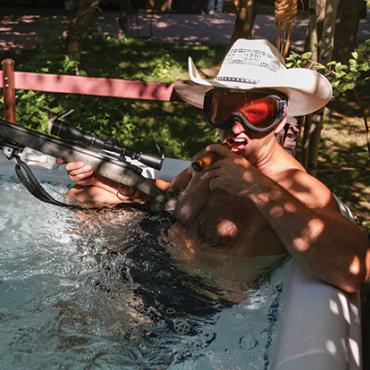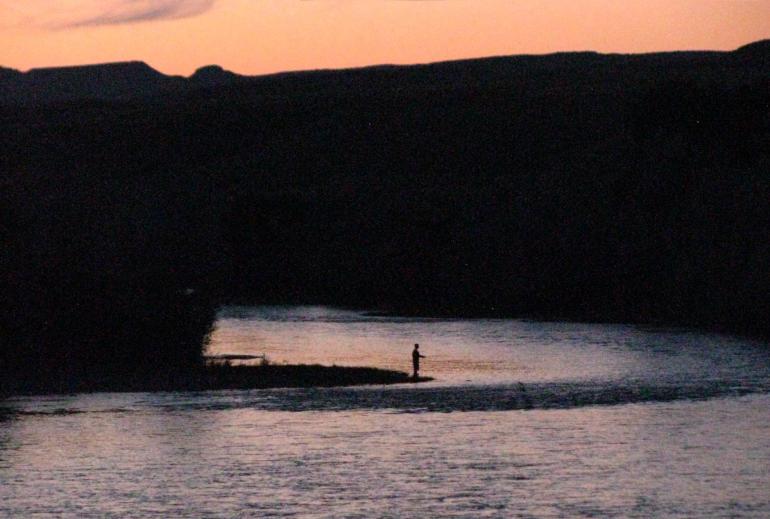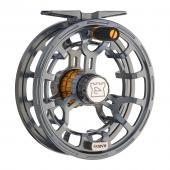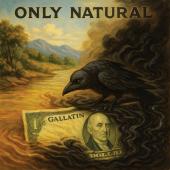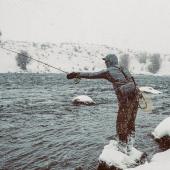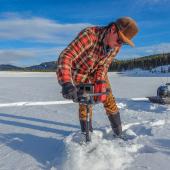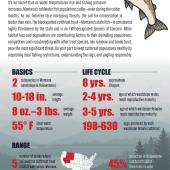Back on the Gallatin
The “No Trespassing” sign loomed large on the dry, cracked fencepost, its black letters cold and threatening. A hundred yards behind it lay the river, calling to me in sonorous tones of riffle and rushing current. Deep runs, sweeping bends, long, shallow tail-outs—a trout fisherman’s river of dreams if there ever was one. Looking around, I was tempted to sprint forward and hurdle the sign, fly rod in one hand and an irreverent finger salute in the other. But a sudden premonition stopped me short: a shotgun blast echoing through the trees, me sprinting down the bank clutching a pellet-ridden backside, and a flannel-clad rancher in hot pursuit.
Still, I was determined to fish this stretch of the Gallatin River one way or another. It had been five years since I’d waded the Gallatin’s cool, clear water, and this particular spot, just minutes from downtown Bozeman, had been my favorite. Down the road was a small ranch house; perhaps it was the source of the newly posted off-limits sign. As I drove up to the house and turned in the driveway, a man stood on the porch eyeing me suspiciously. Knowing this would probably be my only chance to regain access to one of the best stretches of water in the Gallatin Valley, I donned my most congenial smile and walked toward him.
He was about sixty, over six feet tall, swarthy and wrinkled from years of summer sun. Standing with his arms folded across his chest, he was an imposing figure. "Is there something I can do for you?" he asked, his eyes narrowed. He made no attempt to hide his doubt of my motives or his displeasure at my presence.
I panicked, blurting out my name and issuing a string of qualifications that would separate me from the other unworthy supplicants who had stood here before me. I gave every detail of my life that might benefit my cause, explaining that my absence from these parts was due to several years of military service, and that I was indeed a Montana native. I started to fabricate a tear-jerking story about a childhood on the farm and a recently deceased, war-hero father who had taught me to fish on this very piece of water, and had asked that his cremated remains be deposited in the swift current of the Gallatin River. I even had an old earthenware jar in the truck to substantiate my story. But he stopped me short, his grizzled face breaking into a broad smile. "Okay, son. That’s enough," he said between chuckles. "You can fish here. Park up on the hill by them rocks." Shaking the old man’s hand, I thanked him and jumped in the truck, tearing up the hill with visions of sleek, brightly colored rainbows swimming through my mind.
At the top of the hill I parked and stepped out. Below me, a broad ribbon of exposed limestone led down to the river bottom. Weaving its way through towering cottonwoods and thick willows was the Gallatin River, that cool, mountain-fed stream I had admiringly described to my army buddies as we languished in the steamy Georgia mud. Captivated, I stared awhile at the trees, the rushing water, and the majestic mountains looming beyond, all sharply defined by the bright afternoon sun. I took off my shirt and threw it in the truck. I don’t know why, but I always wear as little clothing as possible when I fish. Maybe it’s just my way of making the experience that much more primal. In shorts and no shirt, I somehow feel less of an intruder, and more of a participant. I’d probably wear a loincloth if I could get away with it.
As I gazed out over the river, that familiar mix of anticipation and contentment came over me. Fly-fishing is one of the few forms of recreation where the process is as rewarding as the end result—fishing and catching are equally enjoyable. With this in mind, I carefully assembled my rod and got my gear together. It felt good to wear the vest again—I’d forgotten how well it conformed to my body, how my hands instinctively knew which pockets held what gear.
I worked my way down the limestone slab into the shade of the trees below, emerging near a wide side-channel that parted from the main flow about a quarter-mile upstream. Crossing to the island formed by the divergent flows, I moved upstream, noting the changes in the river caused by years of spring flooding. Certain bends and holes had disappeared; others had formed elsewhere, creating new runs and riffles. But it was the same old Gallatin, and it had the same overwhelming sense of fertility. I knew it was as full of trout as ever.
Wading out into the river, I threw a bead-head pheasant tail into the slower water adjacent to the main rush of the current. On the fifth cast I felt a distinct tap, and I set the hook on a spunky, foot-long rainbow. He jumped three times before I could get a hand around his smooth, cool skin. I released him, thinking about how the Gallatin’s cold, fast water weeds out weaker fish, leaving only strong, willful trout that defy fishermen to wear them out.
Over the next hour I caught three more fish, all strong and healthy like the first. Nothing too big, just scrappy ‘bows and browns so typical of the Gallatin. I looked at my watch. It was 7:30—time for the evening hatch to start kicking in. Working my way downstream, looking at the river’s altered topography, I began to worry—will the fish be taking dry flies anymore? Had they altered their feeding habits? As I rounded the bend above the slower secondary channel, I scanned the water’s surface. Near the far bank I saw a splash: they were rising!
Though I’d learned at a young age to always finish out a cast, five years of waiting for a big buck rainbow to slurp a #18 dry fly got the best of me. I retrieved my nymph in mid-drift and literally ran down the bank. A few more fish were intermittently rising as I stopped in front of the run. Quickly tying on an Adams, I slapped on some Gink and waded out. After a few feet I stopped and gazed around in wonder. There was no sign of another human being, yet I did not feel alone. I was a member of this environment, this complex and virile world of the Gallatin River. I closed my eyes and listened to its music: the wind in the trees, a sparrow’s trill, the balanced, rhythmic gurgling of the water.
The splash of a rising trout snapped me out of my reverie. I carefully laid the Adams about fifteen feet above him, and, rigid with anticipation, let it drift. Another splash and the Adams disappeared. With a spasmodic jerk I pulled the fly right out of the trout’s mouth. I took a deep breath and casted again.
The Adams disappeared in a whirl of water once more. This time I waited half a second and smoothly brought my rod up. I felt the familiar heaviness of a good fish as he made a run downstream. I put some weight on him, and he responded with a leap out of the water that caught me off guard. He was almost a foot in the air, shaking his body violently. Then back in the water for a run upstream. I watched my line cut through the water as he tore up the river. A few more jumps, a beeline for my legs that had me stripping line like a crewmember on the Olympic sailing team, and I had him in the net. A beautiful 18-inch rainbow. Though not huge, he’d fought like ten fish, and I quickly, gently released him. He slipped into the current and disappeared.
After cleaning my fly, I looked up to see the water erupting with the splashes of rising trout. I picked out what looked like the most active group of fish and threw my line into the current. Three or four fish took insects right next to my fly, ignoring it completely. Ten more casts and I knew it was time to change.
But to what? I snatched a fluttering insect out of the air and inspected it. This was a relatively pointless gesture, though, due to my complete absence of insect knowledge. I know I should learn, but I never do. It’s that word: entomology. It conjures images of a sallow, disheveled nerd in a dirty white frock, peering at cockroaches through coke-bottle glasses. Not to mention that learning about insects requires research (always a daunting concept), which is time that could be spent on the river. So there I was with a bug in my hand, wondering what it was. All I could say about the thing was that it was small and tan. Foraging through my foggy memory, I decided it was probably a caddisfly. I put on a #18 elk-hair caddis and hoped for the best.
I got lucky. The water exploded as a hungry trout engulfed the fly. I reared back, got a piece of him, then popped loose. Several more casts produced similar results. Then another solid hook-set, another five-minute fight, and another rainbow in the net. At this point, I was in disbelief—8:00 on a beautiful summer evening, not a mosquito in the air, and trout rising all around me. I let the fish go, and tossed my line across the shimmering water.
At 9:30 the last rays of light began melting into the trees. I’d already landed over a dozen fish, had innumerable takes, and the fish were still rising! Taking advantage of the low light, I cut off the #18 caddis and snipped my 5x tippet. I tied on a #14 Blond Humpy right to the end of the leader and sent my line to the far bank. I could barely make out the line as it drifted downstream. Hearing a splash near its end, I took a guess and brought my rod up.
I was right. I felt the solid weight of a big trout. He immediately bolted upstream, and despite my six-pound leader, I had to give him line. I applied some pressure, and he turned and shot towards me. Once again I was stripping line as fast as humanly possible, and I managed to keep tension on him. He whirled, broke back upstream, and as I laid into him again he jumped. The moon had found a gap in the evening clouds and illuminated his long, sleek, glistening body. My jaw dropped.
Suddenly my line went slack, and I knew he’d thrown the fly. I threw my head back and laughed.
I’ve never laughed upon losing a big fish. I’ve screamed, cried, thrown my rod, kicked trees, renounced God, and issued a stream of obscenities that would make a Hell’s Angel blush. But this night I laughed. Why? Maybe I laughed at myself, because the trout, a manifestation of raw, unbridled nature, had beaten me, Omnipotent Man. My years in the city, surrounded by people, concrete, and steel, had created the illusion that we humans are in charge, that we control the Earth. This trout’s deliberate, unconscious defiance had reminded me of my relative insignificance. I meant no more to this vibrant, untamed environment than did the crickets or the birds, and I was just as powerless to control it.
Or maybe it was because the night was perfect: the cool water, the fresh Montana air, the wind blowing through the cottonwoods, fish rising to every side of me under a bulging gibbous moon, in a river that wound its way through a lush valley of grassy meadows and fragrant evergreens. Maybe I laughed because I felt alive again—after a long absence, I was a part of this visceral existence that knows no machines or time, this natural world that by its very nature is comprised of successes and failures. I was grounded in it, connected to it, and bound by its universal, immutable laws.
I continued to catch fish until 11:00. It really is true about the big fish coming out after dark—not one was less than 16 inches. When 10 consecutive casts failed to induce a rise, I left. At the top of the hill I looked back at the winding river. Being back on the Gallatin restored something in me, something that had disappeared without my realizing it. And I knew that no matter where I went, or what happened in my life, I could always come back here to find it.

